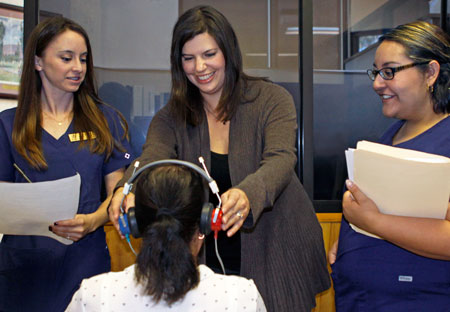Originally published November 20, 2015
By Laura L. Acosta
UTEP Communications
Imagine living with hearing loss. You’re driving down the road on a windy day with the windows rolled down. You’re not wearing a hearing aid. As you struggle to hear your passenger, your attention shifts from the road to your conversation. Suddenly, you roll past a stop sign.
Jamie Desjardins, Ph.D., an assistant professor in the speech-language pathology program at The University of Texas at El Paso, uses a similar anecdote to explain how untreated hearing loss can impair a person’s cognitive skills.

“If you have some hearing impairment and you’re not using hearing aids, maybe you can figure out what the person has said, but that comes with a cost,” Desjardins said. “You may actually be using the majority of your cognitive resources – your brain power – in order to figure out that message.”
Hearing loss affects more than 9 million Americans over the age of 65 and 10 million Americans ages 45 to 64, according to the American Academy of Audiology.
“Only about 20 percent of people who actually need hearing aids will purchase them and wear them,” Desjardins said. “There’s a stigma attached. People think it makes them appear older when the fact that they can’t hear or know what’s going on is really what makes them look older.”
Studies have shown that hearing loss, if left untreated, can lead to serious emotional and social consequences, reduced job performance and diminished quality of life. Hearing loss also can interfere with cognitive abilities because so much effort is put toward understanding speech.
As people age, basic cognitive skills – working memory, the ability to pay attention to a speaker in a noisy environment, or the ability to process information quickly – begin to decline.
Desjardins has been studying the effects of hearing aid use since she was a graduate student at Syracuse University. Her most recent study found that when used correctly, hearing aids improve cognitive ability in persons with hearing loss.
For her research, Desjardins studied a group of individuals in their 50s and 60s with bilateral sensorineural hearing loss who had previously never used hearing aids.
They took cognitive tests to measure their working memory, selective attention and processing speed abilities prior to and after using the hearing aids.
After two weeks of hearing aid use, tests revealed an increase in percent scores for recalling words in working memory and selective attention tests, and the processing speed at which participants selected the correct response was faster.
By the end of the study, participants had exhibited significant improvement in their cognitive function.
“Most people will experience hearing loss in their lifetime,” Desjardins explained. “Think about somebody who is still working and they’re not wearing hearing aids and they are spending so much of their brainpower just trying to focus on listening. They may not be able to perform their job as well. Or if they can, they’re exhausted because they are working so much harder. They are more tired at the end of the day and it’s a lot more taxing. It affects their quality of life.”
Desjardins has presented her research at the American Speech Language Hearing Association’s national convention. Her manuscript is currently under review by the American Journal of Audiology.
Her next study will focus on the use of hearing aids by Hispanics. Research shows that only five percent of Mexican-Americans wear hearing aids.
To find out why more Hispanics are not wearing hearing aids, she has developed a survey to investigate their attitudes toward hearing loss.
Desjardins and her students interviewed participants for the study at a health fair at the Mexican Consulate in El Paso on Nov. 3, 2015.
“The survey asked them if they think they have hearing loss,” Desjardins explained. “It asked questions like, “Would you use a hearing aid if you needed it? Why not? Do you know where to get one? Can you afford one? Do you think they make you look older?’”
The opportunity to participate in Desjardins research study has allowed undergraduate students like Ninivie Gomez to develop a better understanding of speech and hearing.
“I am particularly interested in the well-being of the older populations,” said Gomez, a pre-speech language pathology major, who helped Desjardins with the surveys at the Mexican Consulate. “Dr. Desjardins’ research focuses on the hearing issues involving the geriatric demographic. It was interesting to note the different attitudes and perceptions (they have) around the use of hearing aids.”
Desjardins also will begin work on another study that will look at older bilingual people and their ability to understand speech. As a member of the 2016 BUILDing SCHOLARS Supermentor Program, Desjardins will work with her mentor William Yost, Ph.D., from Arizona State University on a research proposal that she plans to submit to the National Institutes of Health (NIH) next year.
“The best thing you can have when you’re writing a grant is an experienced, funded NIH researcher to read what you are writing and provide you with constructive feedback,” she said. “It will significantly improve the quality of your grant application and your chances of receiving funding.”